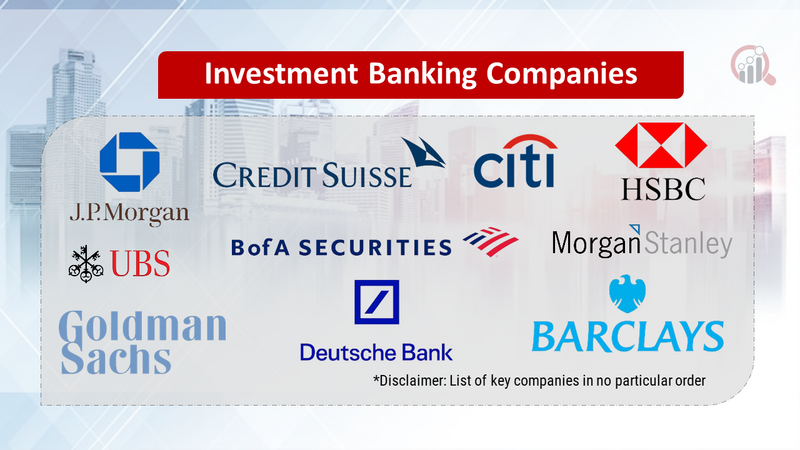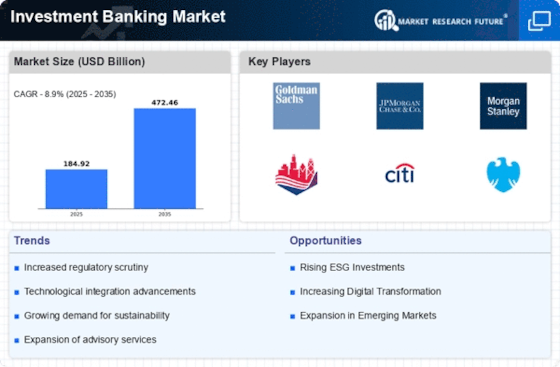Top Industry Leaders in the Investment Banking Market
 The Investment Banking Battlefield: Strategies and Players in a High-Stakes Game
The Investment Banking Battlefield: Strategies and Players in a High-Stakes Game
The investment banking market pulsates with ambition, fueling mergers, acquisitions, IPOs, and capital raises that shape the global economy. It's a competitive landscape where giants clash and nimble newcomers disrupt, vying for market share and a slice of the lucrative fees generated by advising corporations and investors. Let's delve into the key players, their strategies, and the critical factors shaping their success in this high-stakes arena.
Key Players:
- JPMorgan Chase & Co.
- Citigroup Inc.
- Goldman Sachs
- BofA Securities
- Morgan Stanley
- UBS
- Credit Suisse Group AG
- Deutsche Bank AG
- The Hongkong and Shanghai Banking Corporation Limited
- Barclays
Strategies for Market Share:
-
Talent Acquisition and Retention: Attracting and retaining top bankers is crucial. Global titans leverage their training programs and prestige while boutique players offer personalized career paths and high compensation. Digital disruptors focus on attracting tech-savvy individuals who can build innovative platforms.
-
Product Diversification and Innovation: Expanding into new services like debt restructuring, private equity, and wealth management diversifies revenue streams and attracts new clients. Global players leverage their infrastructure while boutiques seek partnerships with specialists. Digital disruptors offer unique features like mobile-first investing and gamified IPO participation.
-
Global Reach and Relationship Building: Building strong relationships with corporations, investors, and regulators across geographies is key. Global titans leverage their extensive networks while boutiques focus on specific regions and cultural sensitivities. Digital disruptors aim to build global communities through online platforms and partnerships.
-
Technology Adoption and Integration: Embracing technology to streamline processes, analyze data, and personalize client interactions is crucial. Global players invest in proprietary research tools and AI-powered analytics while boutiques adopt off-the-shelf solutions. Digital disruptors build their entire business model around cutting-edge technology platforms.
Factors for Market Share Analysis:
-
Revenue and Deal Volume: These primary metrics offer insights into a player's financial strength and activity level. However, they don't always reflect profitability or niche strengths.
-
Advisory Fees and Profitability: Analyzing fee structures and profitability ratios reveals a player's pricing strategy and efficiency. Global titans may command higher fees but incur overhead costs, while boutiques and independent banks may rely on lower margins and higher deal volume.
-
Client Focus and Industry Expertise: Understanding a player's target clientele and industry specialization reveals their competitive advantage. Global titans offer broad coverage but may lack depth, while boutiques excel in specific sectors and independent banks focus on regional strengths. Digital disruptors cater to underserved segments like retail investors.
-
Market Trends and Innovation: Adapting to evolving market trends like digitalization, sustainable investing, and regulatory changes is key. Global players leverage their resources to invest in new technologies and adapt to regulations, while boutiques and independent banks may struggle to keep pace. Digital disruptors are inherently positioned to exploit these trends.
New and Emerging Companies:
-
Vise: Connects companies directly with investors for debt and equity financing, challenging traditional underwriting models.
-
CapStack: Provides data and analytics tools for investors to analyze and compare investment opportunities, democratizing access to information.
-
Sharestake: Creates fractional ownership opportunities in private companies, enabling retail investors to participate in historically restricted markets.
Current Investment Trends:
-
Technology Integration: Investing in AI-powered data analysis, automation tools, and blockchain-based solutions for secure transactions is gaining traction across all players.
-
Emerging Markets Focus: Expanding into high-growth economies like China, India, and Southeast Asia presents significant opportunities for global and regional players.
-
Sustainable Investing: Growing demand for ESG-focused investments is prompting players to develop expertise and advisory services in this area.
-
Collaboration and Partnerships: Collaboration between traditional players and fintech startups is becoming increasingly common to leverage each other's strengths and capture new market segments.
The investment banking landscape is dynamic and ever-evolving. Understanding the key players, their strategies, and the factors shaping their success is crucial for corporations, investors, and anyone seeking
Latest Company Updates:
-
Fintech disrupting traditional players: Fintech startups are making inroads into various investment banking functions like wealth management and trade finance, challenging established institutions. (Nov 07, 2023) -
AI and data analytics transforming operations: Artificial intelligence and data analytics are being used to improve deal sourcing, risk management, and client services, driving efficiency and effectiveness. (Jul 26, 2023) -
Cybersecurity becoming paramount: With increasing cyber threats, investment banks are investing heavily in cybersecurity measures to protect sensitive client data and financial transactions. (Jan 18, 2024)











